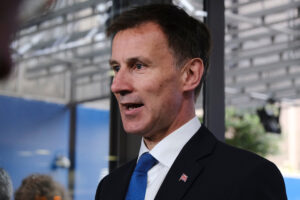Treasury officials are examining whether the autumn statement could include changes to non-dom status and moves to raise taxes on dividends by cutting tax-free allowances.
No final decisions have been taken but Whitehall sources said options were being examined by the Treasury’s high net worth individuals policy team.
Changes could include reducing the time period over which high net worth individuals can avoid tax on their worldwide income. Experts suggest that cutting the duration from 15 to five years could raise an additional £1.6bn a year.
The chancellor, Jeremy Hunt, is also looking at cutting the tax-free threshold for shareholders’ earnings from dividends from its current level of £2,000 – though a more ambitious move would be to increase the percentage of tax paid at the three thresholds, the highest of which is just under 40%.
He has previously said the guiding principle will be that “those with the broadest shoulders should be asked to bear the greatest burden”.
Hunt has also been asked to consider changes to capital gains tax, which has the potential to bring in billions if it were changed to match income tax rates. Such a change was the top recommendation of the Office of Tax Simplification in 2020 but it was rejected by Rishi Sunak last year.
The chancellor is aiming to submit the key plans of the statement for review to the Office for Budget Responsibility by the end of this week so they can begin to build them into their forecasts.
Any move on non-doms would be a politically risky one for Sunak, whose wife, Akshata Murty, is a non-dom. In April, Murty agreed to pay tax on all worldwide income in future, though not backdated.
Murty previously paid £30,000 a year for the status, which means she does not pay UK tax on her overseas income. Under the current rules, the status would have automatically ceased once she has resided in Britain for 15 years.
The change has long been feared by Labour, which has said it would abolish the loophole entirely, using any extra income from this to fund some of its own proposed spending commitments.
The shadow chancellor, Rachel Reeves, has said scrapping the tax break in full would raise £3.2bn a year and Labour would use these funds to pay for an expansion of the NHS workforce. However, the party would also need a proposal for a new regime for temporary residents, which could be between six months to five years.
Sunak and Hunt are said to have agreed that tax thresholds will be frozen until 2028, two years longer than previously announced. It would raise money from millions as inflation drags more people into higher tax brackets or into paying tax for the first time. It is predicted to raise £5bn a year but has been labelled a “stealth tax”.
One of the biggest targets for tax increases is likely to be oil and gas companies. with a beefed-up windfall tax increasing the rate to 30% from 25% and extending the tax for a further three years until 2028, with a potential expansion to cover electricity generators.
That is another policy Labour has called for – and would leave the opposition with even less room for manoeuvre with its own spending plans.
On several key areas of controversy, there has been no final decision, according to Treasury sources. Two areas that could bring big savings for the Treasury are changes to benefit increases and to the pensions triple lock, which Hunt has said are on the table, although he and Sunak have said they will prioritise the most vulnerable.
Conservative MPs have already made clear their hostility to changes to the triple lock or to linking benefits to wages rather than inflation, when Sunak has previously promised the latter.
The other key area in play is public sector pay, which could be limited across the board to salary increases of just 2% in 2023-24, according to the Times. However, the limited rise is likely to fuel discontent in a sector where there are already multiple strike actions or impending ballots.
Read more:
Non-dom tax breaks being reviewed by the Treasury in effort to raise revenue
























